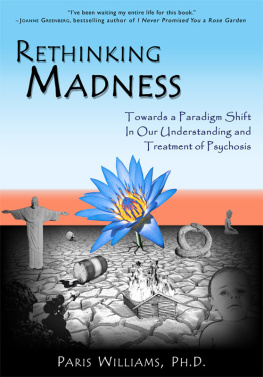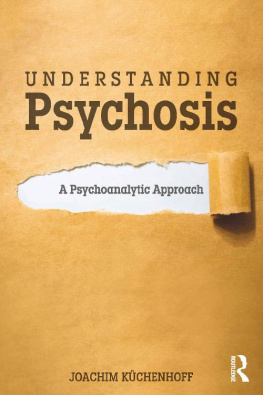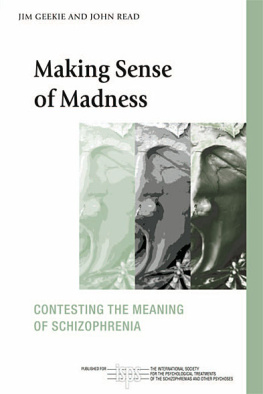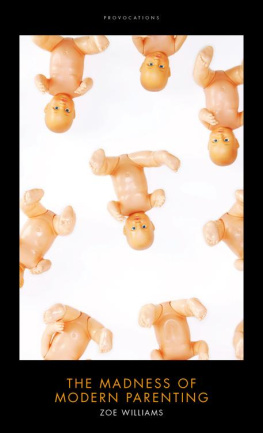Contents (brief)


Contents (detailed)


List of Tables

- 15+ Year Longitudinal Schizophrenia Recovery Studies
- Suggested Similarities and Distinctions between Mysticaland Psychotic Experiences. (Source: Jackson, 2001, p. 170)
- Converging Themes and Divergences for The Onset andDeepening of Psychosis
- Converging Themes and Divergences for Description of theAnomalous Experiences
- Converging Themes and Divergences for Recovery
- Converging Themes and Divergences for Lasting PersonalParadigm Shifts
- Converging Themes and Divergences for Lasting Benefits
- Comparison of the Participants PTGI Results
- Converging Themes and Divergences for Lasting Harms
- Converging Themes and their Associated Divergences forthe Six Categories of Experience
List of Figures

- The psychotic disorders and sanity/madness as continuums
- 3-Year Outcome Measures for the Four Different Groups ofthe Agnews Study
- 15-Year Outcome Measures for the Two Groups in theNIMH Chicago study
- The downward spiral of stigma and hopelessness
- The self-reinforcing circle of the myths of no recovery
- The contnuum of psychosis and spiritual emergency
- A graphical depiction of Ranks life fear / death fear dialectic
- A graphical depiction of Yaloms life anxiety vs. deathanxiety dialectic
- A graphical depiction of Mays existential dialectic
- Four different Western existential dialectical models
- A common Eastern existential dialectical modeldialectical monism
- The self/other dialectic
- Our constant struggle to find some middle groundbetween autonomy and connection
- Skewed windows of tolerance
- Narrow and wide windows of tolerance
- Movement along the axis of rapprochement vs. changes inones window of tolerance
- A graphical depiction of the DUI model, with theincorporation of the principles of duality and unity
- A diagram illustrating the possible outcomes resultingfrom a significant transliminal experience.
- A successfully integrated transliminal experience.
- A recoil response to a transliminal experience may occur if the experience is unable to be integrated
- The range of dialectical tension that allows for the ongoing existence of the self
- The difference between the expansion of ones window of tolerance versus the shifting of it
- A diagram listing the succession of strategies employed by the psyche to maintain ones experience in alignment with ones window of tolerance
- The inverse correlation between dialectical tension and the degree of unitive feelings within conscious experience
- Steps leading to the onset of Sams psychosis
- Steps leading to the onset of Theresas psychosis.
- Steps leading to the onset of Byrons Psychosis.
- Steps leading to the onset of Cheryls psychosis.
- Steps leading to the onset of Trents psychosis.
- Steps leading to the onset of Jeremys psychosis.
- Dramatic fluctuations of the self system on two different levels during psychosis
- Experiences of good, evil, creation, and destruction associated with the fluctuation between relatively high and relatively low dialectical tension.
- The different layers/realms of our experience as kept relatively distinct by our cognitive constructs
- The different layers/realms of our experience when the boundaries are blurred during psychosis
- The three factors of connecting with ones aliveness, hope, and meaning acting together symbiotically to support recovery
Acknowledgments

Now that the writing is finally finished, I have the great pleasure of expressingmy appreciation to all of those who have supported me in this long process. Inmany ways, the journey that culminated in my series of research studies andfinally in this book began long before I ever set foot in a university. There are somany individuals who inspired me, challenged me, and/or touched me in someimportant way along this journey that I couldnt possibly name all of them here.Indeed, one of the greatest lessons I have taken from this journey is a greaterappreciation for the very intricate web of interdependence that shapes my everythought and action. I express my deepest gratitude to all who have contributeda strand to this web.
I want to express special appreciation to the members of my doctoral researchand dissertation committeesDrs. Linda Riebel, Kirk Schneider, Tom Greening,and my wonderful chair, Doris Bersing.
I also want to express my deepest gratitude to all of the participants of thethree research studies that culminated in the writing of this book. I hold thehighest admiration for the courage that every one of you exhibited in your willingnessto plunge so deeply into what were often very painful memories in orderto share the details of your journeys and the tremendous wisdom youve gainedwith the rest of us.
I also want to thank the many people who provided important feedback relatedto the structure of this book. I am especially grateful to Melissa Grabanskifor her excellent guidance in this regard.
Finally and most of all, I want to express my deepest gratitude to my wife, Toni.There is no doubt that her combination of rare insight into the human conditionand (nearly) inexhaustible patience have been my most valuable resources.

Anais Nin

Patricia Deegan1
Preface

D uring the past several years, I conducted a series of research studies thatinquired deeply into the experiences of people who had made full andlasting recoveries from schizophrenia and other long term psychotic disorders.As the participants revealed their stories one by one, I became increasinglyastonished by what I was learning. The deep meaning within these participantsexperiences and the profound positive transformation that each of them had gonethrough flew completely in the face of virtually everything I had ever learned inthe mainstream texts about psychosis. I dove deeper and deeper into the existingresearch on schizophrenia, psychosis, and recovery, trying to make sense of whatI was learning. The common beliefs about psychosis and schizophrenia that areheld so strongly in the West quickly began to slip away like so much sand throughmy fingers. I realized that what I was learning from these participants was takingme so much further than I had ever imagined possible, sending me on a journeynot unlike Alices descent into the rabbit hole.















